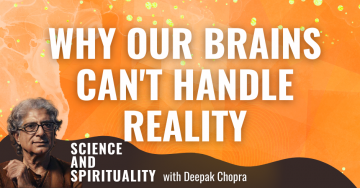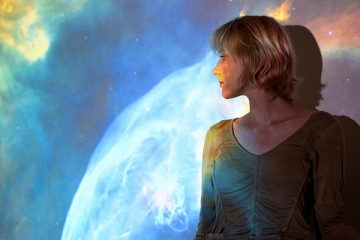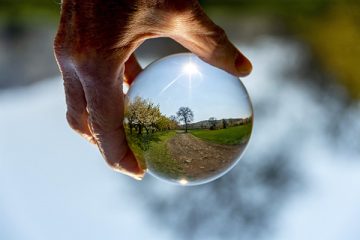Why Our Brains Can’t Handle Reality.

Our brains are amazing, but can they truly grasp the infinite complexity of reality? Join Deepak Chopra for an exploration into the fascinating world of animal senses, explore the limits of human perception, and question what “real” even means. This episode blends science and spirituality to explore the mind-blowing mysteries of existence.
Listen to the podcast here
Why Our Brains Can’t Handle Reality
We are going beyond the quantum body because my real interest is the quantum body. What is ultimate reality? As a medical student, my notion of objective reality became everything we perceive as human beings. As a pre-med student, I was very interested in the perceptual activity of other biological organisms. I spent a lot of time with my pre-med teacher, private tutor, that my father got me because I hadn’t taken biology in high school.
I had a private tutor and he would take me frog hunting, dissecting frogs, looking at bees, birds, and so on. What I learned was actually quite remarkable in my pre-med years after high school. My private tutor was much more interesting than what I learned in medical school. I want to share some notes with you and that I still have and look at other species and their perceptual realities.
Here we go. Bees, honeybees, and other bees see ultraviolet light, which is invisible to humans, and it helps them navigate flowers and find pollen. They also have a compound eye structure, giving them a panoramic view but lower resolution than ours. Bees can have a panoramic view of form and phenomena.
There are birds of prey that possess exceptional visual acuity, allowing them to spot prey from vast distances. Some birds, like eagles, even see ultraviolet light like bees. Bats use echolocation, not vision, to navigate and hunt. They emit high-frequency sounds and interpret the echoes to build a 3D map of their surroundings.
When it comes to smell, dogs have an olfactory sense, millions of times stronger than humans. They can use send to track prey, recognize individuals, and even detect emotions. Snakes detect scents with their tongue, flicking them out to gather odor particles. This information helps them find food, mates and potential dangers. Thanks to specialized scent receptors on their antennae, butterflies can smell flowers from miles away. This helps them locate nectar sources and avoid poisonous plants.
Electrical eels generate and sense electrical fields, allowing them to communicate, navigate, and detect prey and predators. Sharks can sense minute changes in water pressure, helping them detect prey even buried in the sand. Dolphins use echolocation similar to bats but can also communicate and navigate using sound waves.
Objective Reality
When we studied these diverse sensory systems, it’s very obvious that the biological organism itself is a sensory system experiencing different bandwidths of what ultimately has to be quantum information because everything starts at the quantum field, which, by the way, is not even in time. This leads to a very interesting conundrum. What is object to reality?
All of science is based on objective reality, but what we call objective reality is a species-specific perceptual activity. As scientists, we call objective reality the species-specific perceptual activity that is human. What is ultimate reality? Ultimate reality has to be what makes all these other realities possible. There has to be some underlying real reality that makes all these different realities possible in the ecosystem of life.
What is that? Is that quantum? As a mathematical model, we could say that, but then where do these models arise? They’re created in the human mind, aren’t they? Even as we describe all these different perceptual realities of other species, we describe them in terms of human experience. I think one point here could be very valuable, and that is that the ultimate reality has to be non-local. Non-local means not in space-time, formless, unimaginably, irreducible, fundamental field of possibilities. That is what gives rise to these different species-specific perceptual experiences.
Awareness
It also raises another fundamental issue because all of our science is based on empirical facts, but aren’t empirical facts just human perceptual snapshots of experience? Where are all these experiences happening? In the inconceivable and imperceivable. The common ground of every perceptual activity which is finite. Every perceptual activity has a beginning, a middle, and an end, but the common ground of all these perceptual activities is awareness. Awareness has to be the infinite principle in which all perceptual activity occurs.
The infinite domain beyond space-time in which species-specific perceptual activities occur in time. The timeless is differentiating itself into time-bound realities. Now, of course, this gets mind-boggling and almost incomprehensible because, in reality, reality is incomprehensible. We try to make sense of it. The gift of being human, even though we have this biological apparatus, the human biological apparatus is just a sensor. The gift of being human is we can actually think about all these other possibilities.

Reality: Beyond time, beyond form, lies the infinite awareness.
Actually, even through technologies, learning from the experiences of other species extends our range of experience into more and more possibilities in the virtual reality that we call everyday reality. This is the deeper meaning of Maya, the bigger illusion, the cosmic dream that is happening in the infinite, non-local spaceless, timeless formless as irreducible, incomprehensible, unimaginable self. The ground of that being.
The ground of that cosmic being is also the ground of your being. I think there’s something very special about the human mind that has differentiated from the infinite consciousness that we can even begin to comprehend. The more we try to comprehend it, the more incomprehensible it becomes and then the only choice is to surrender to mystery.

Reality: Objective reality? More like species-specific perception.
I don’t think the mystery can’t be solved through the limitations of the human perceptual apparatus of the human brain or the human mind. After all, the human species has only evolved over the last 200,000 years. I think if we were humble enough to acknowledge that reality is a mystery, then it doesn’t matter what name we give it, God, the divine, inexplicable, formless. As Tagore said, “In this playhouse of infinite forms, I caught sight of the formless, and so my life was blessed.”

Reality: If we are humble enough to acknowledge that reality is a mystery, it doesn’t matter what name we give it.
Looking at my hand right now, is my finger touching the thumb or is my thumb touching the finger? Is my finger feeling the thumb, is my thumb feeling the finger or are they feeling each other? On a perceptual and visual level, this is a form and formless form. The formless engulfs every form. That formless is actually differentiating into species-specific forms and phenomena that we call the world.
How we came to know this or how random mutations in natural selection got us here is an oversimplification. I think we’re engulfed in a divine mystery. When we surrender to it, there is a feeling of awe, wonder, humility, and magnificence. That is the real spiritual experience, wonder, awe, humility and surrender to divine mystery. That is the real spiritual experience.
Tweet: Surrender to mystery. Wonder is the true blessing
You don’t have to be religious to experience that because religion as a system of thought is never going to get us there. In fact, no system of thought, biological thought, physics or mathematics, which remains a mystery anyway, none of that is going to give us access to reality. Only in the stillness of the formless, which is modifying itself into infinite forms and phenomena, will we have some clue as to what is happening.
We have no reason. We have no idea why it is happening or even what it is that is morphing into these infinite forms and phenomena. So much for my random thoughts. I just wanted to share what I was thinking and I finally gave up thinking and said, “I just share my thoughts with you without coming to any conclusion,” but it felt spiritual just sharing this with you.

